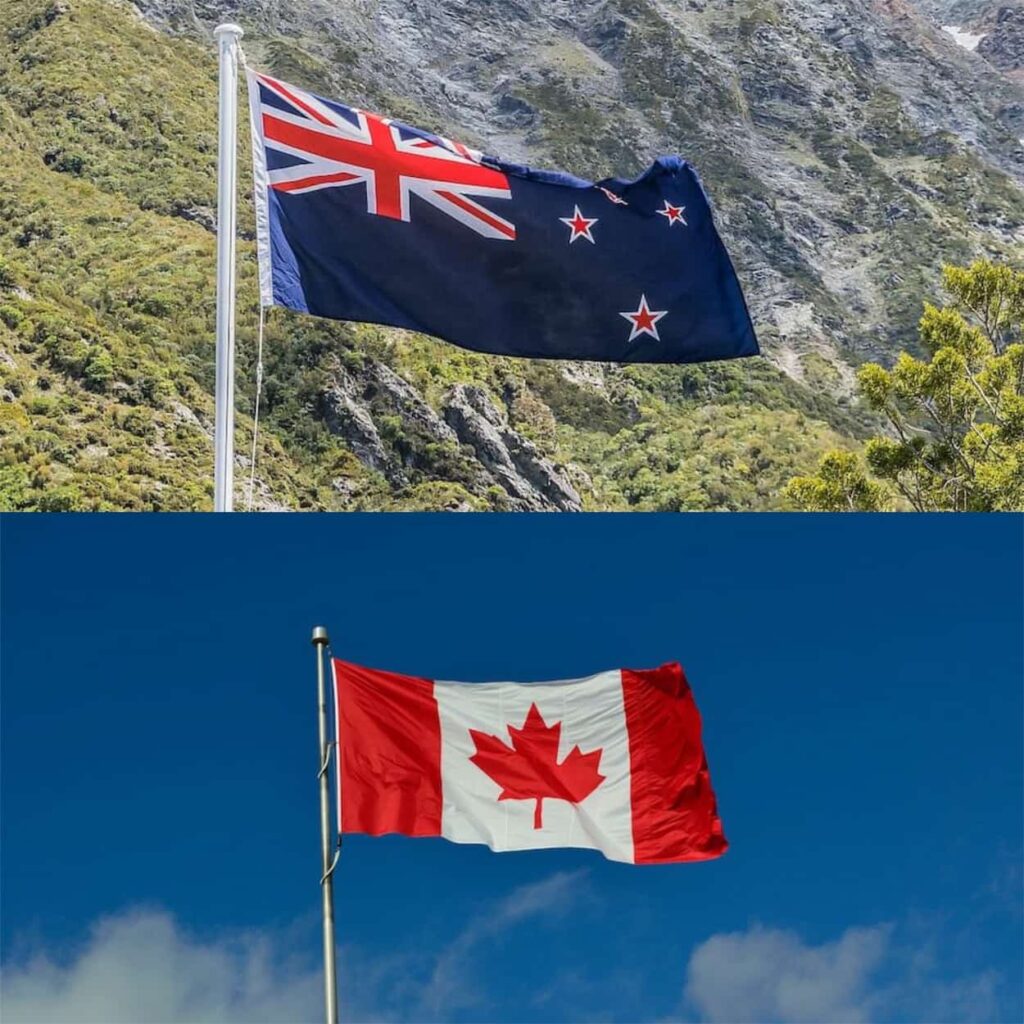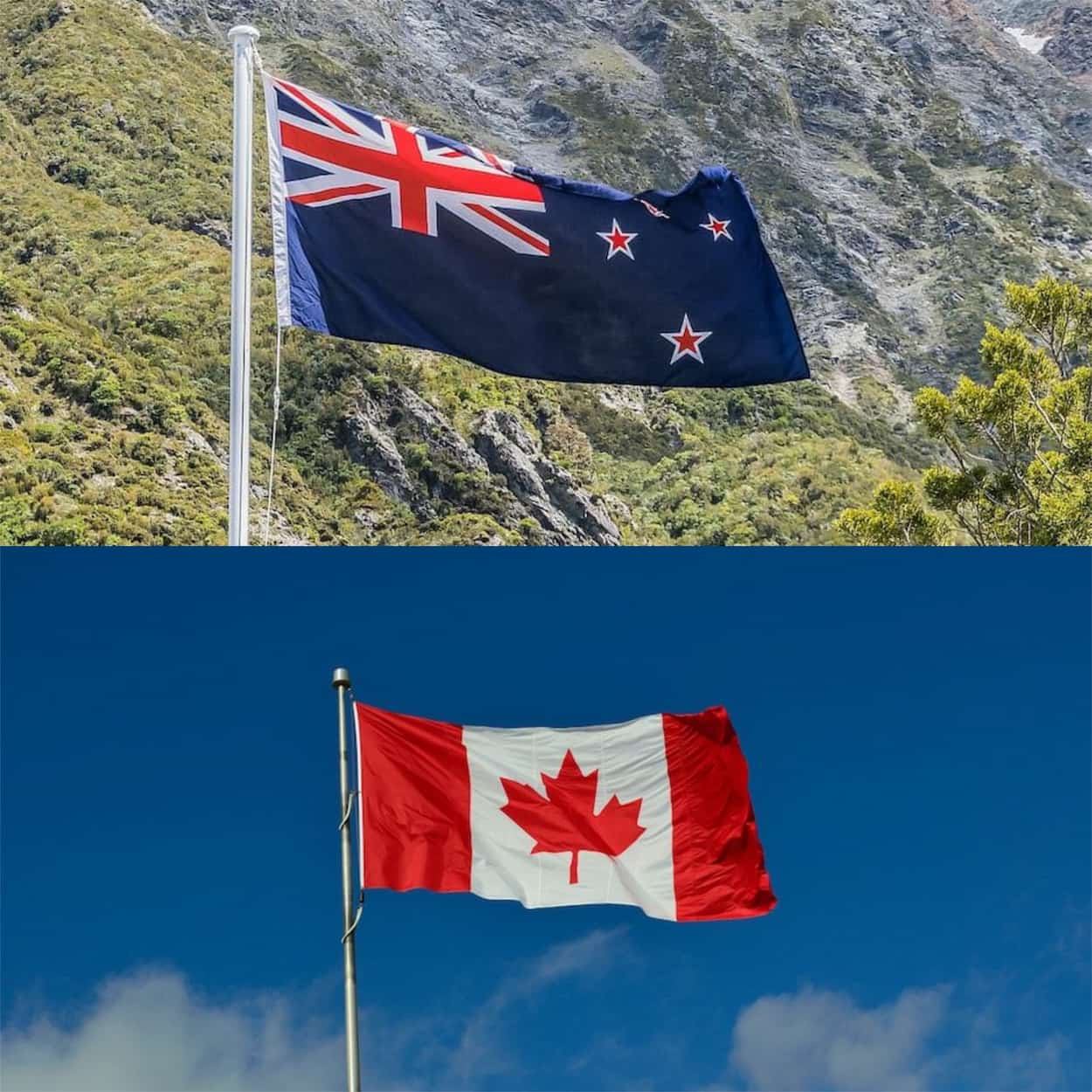Cost of Living in New Zealand vs Canada: 2024 Guide

Have you been trying to analyze the living costs in New Zealand and Canada? No doubt, both countries are very lucrative options for living and settling permanently. However, when you start comparing both countries, you can see the differences.
Consumer prices in Canada are 3% lower than in New Zealand. Both countries offer high quality of life in exchange for a relatively high cost of living. If you’re looking for a country with a more laid-back lifestyle and stunning scenery, then New Zealand is worth your money. If you’re looking for a country with more job opportunities and lower house prices, then Canada may be a better choice.
In this article, we’re going to delve into a detailed comparison of the cost of living in New Zealand and Canada. We’ll explore various categories such as housing, transportation, food, and entertainment. Not only that, but we’ll also provide you with some invaluable money-saving tips for both countries. Keep reading!
Keep in mind that the cost of living is influenced by inflation, hence is subject to constant change.
Also, read our guide on living in Canada vs in New Zealand.
Is it cheaper to live in New Zealand than Canada?

Wondering whether it’s cheaper to live in New Zealand or Canada? Let’s embark on a journey to compare the cost of living in both countries! Housing tends to be pricier in New Zealand, while transportation takes a slightly larger chunk of your budget in Canada.
Generally, consumer prices in Canada are only 3% lower than in New Zealand, excluding the rent. However, Canada becomes a more expensive place to live if we include housing – then consumer prices are 1.4% higher than in New Zealand. Here are more insights from Numbeo (August 2023) – the cost of living is influenced by inflation and is subject to change:
| Rents in Canada are 12.7% higher than in New Zealand |
| Eating out in Canada is only 0.1% lower than in New Zealand |
| Groceries prices in Canada are 2.9% lower than in New Zealand |
| Local purchasing power in Canada is 1.6% higher than in New Zealand |
Overall, the cost of living in New Zealand and Canada is fairly comparable, but there are intriguing nuances to explore. Let’s get an overview of the cost of living in New Zealand first.
Nestled amidst captivating landscapes, New Zealand’s cost of living is higher than in many countries worldwide, yet still more affordable than in some other developed nations like Australia and the United States.
Housing
Canada’s rent prices are 12.7% higher than those in New Zealand. Rent prices have soared in 2023 in both countries due to inflation, but Canada has suffered greatly.
For a one-bedroomed apartment outside the center in New Zealand, you will pay a monthly rent of NZ$1,544, while one in Canada costs NZ$1,776.
Brace yourself for the realm of housing expenses—the ultimate budget-eater in New Zealand. Renting a cozy one-bedroom apartment in Auckland will set you back around NZ$1,959 per month, and if you dream of owning your own abode, the median house price in Auckland hovers around NZ$1,000,000 in June 2023.
Now, let’s find out the cost of living in Canada. This land of opportunity offers a cost of living that is generally lower than its neighboring United States but still higher than many countries worldwide.
Housing costs hold a prominent position in the Canadian expenditure landscape. In the bustling city of Toronto, renting a one-bedroom apartment can set you back around C$1,800 per month, while the cost of purchasing a home averages around C$709,218 across the country.
Toronto and Vancouver are among the most expensive places for house shopping, with average home prices of C$1,182,120 and C$1,271,728, respectively.
Utilities and other bills
Electricity can get expensive in both places, especially with the current crisis. An average utility bill in New Zealand, including electricity, heating, cooling, water, and garbage, comes to NZ$220 per month. An average mobile phone bill is NZ$65, while I pay NZ$53 per month with Vodafone.
Fibre broadband costs NZ$75 for the cheapest deal with 2degrees, Spark is a bit more expensive.
In Canada, the average monthly utility bill is NZ$246. The mobile phone plan costs NZ$68. And fibre broadband is averaging at NZ$105.
So, overall, utilities and other bills are more expensive in Canada by about 13,2% across all services.
Food
Generally, groceries prices in Canada are 2.9% lower than in New Zealand.
Food costs in New Zealand align with those of other developed nations, with some local delicacies like vegetables (yes, you heard it right) costing significantly more than in Canada. At the same time, beef, lamb, and seafood have a slightly lower price tag. Therefore, grocery prices are more or less equal in both countries.
Here are some average grocery and eating out prices in both countries:
| Restaurants | New Zealand | Canada | Difference |
|---|---|---|---|
| Meal, inexpensive restaurant | 25.00 NZ$ (20.30 C$) | 27.09 NZ$ (22.00 C$) | +8.4 % |
| Meal for 2 people, mid-range restaurant | 120.00 NZ$ (97.45 C$) | 110.82 NZ$ (90.00 C$) | -7.6 % |
| McMeal at McDonalds | 15.00 NZ$ (12.18 C$) | 15.93 NZ$ (12.94 C$) | +6.2 % |
| Domestic beer | 10.00 NZ$ (8.12 C$) | 8.62 NZ$ (7.00 C$) | -13.8 % |
| Imported beer | 10.00 NZ$ (8.12 C$) | 9.85 NZ$ (8.00 C$) | -1.5 % |
| Cappuccino (regular) | 5.41 NZ$ (4.39 C$) | 5.92 NZ$ (4.81 C$) | +9.5 % |
| Coke/Pepsi | 3.70 NZ$ (3.01 C$) | 3.12 NZ$ (2.53 C$) | -15.8 % |
| Water | 3.34 NZ$ (2.71 C$) | 2.61 NZ$ (2.12 C$) | -21.8 % |
| Groceries | New Zealand | Canada | Difference |
| Milk | 3.08 NZ$ (2.50 C$) | 3.40 NZ$ (2.76 C$) | +10.3 % |
| Loaf of white bread | 3.18 NZ$ (2.58 C$) | 4.04 NZ$ (3.28 C$) | +27.2 % |
| Rice | 3.23 NZ$ (2.62 C$) | 5.44 NZ$ (4.42 C$) | +68.5 % |
| Eggs | 8.56 NZ$ (6.95 C$) | 5.30 NZ$ (4.31 C$) | -38.0 % |
| Local Cheese | 14.48 NZ$ (11.76 C$) | 18.24 NZ$ (14.81 C$) | +25.9 % |
| Chicken fillets | 15.08 NZ$ (12.24 C$) | 18.38 NZ$ (14.92 C$) | +21.9 % |
| Beef round (1kg) | 22.33 NZ$ (18.14 C$) | 22.42 NZ$ (18.21 C$) | +0.4 % |
| Apples (1kg) | 4.48 NZ$ (3.64 C$) | 6.26 NZ$ (5.08 C$) | +39.5 % |
| Banana (1kg) | 3.51 NZ$ (2.85 C$) | 2.29 NZ$ (1.86 C$) | -34.8 % |
| Oranges (1kg) | 4.97 NZ$ (4.04 C$) | 5.88 NZ$ (4.78 C$) | +18.2 % |
| Tomato (1kg) | 6.96 NZ$ (5.65 C$) | 6.18 NZ$ (5.02 C$) | -11.3 % |
| Potato (1kg) | 3.60 NZ$ (2.93 C$) | 3.95 NZ$ (3.21 C$) | +9.6 % |
| Onion (1kg) | 2.99 NZ$ (2.43 C$) | 4.05 NZ$ (3.29 C$) | +35.4 % |
| Lettuce (1 head) | 4.52 NZ$ (3.67 C$) | 3.94 NZ$ (3.20 C$) | -12.8 % |
| Water (1.5 liter bottle) | 1.81 NZ$ (1.47 C$) | 2.83 NZ$ (2.30 C$) | +56.6 % |
| Bottle of wine (Mid-Range) | 16.00 NZ$ (12.99 C$) | 20.93 NZ$ (17.00 C$) | +30.9 % |
| Domestic beer (0.5 liter bottle) | 5.18 NZ$ (4.21 C$) | 4.33 NZ$ (3.51 C$) | -16.5 % |
| Imported beer (0.33 liter bottle) | 5.96 NZ$ (4.84 C$) | 5.13 NZ$ (4.16 C$) | -14.1 % |
Transportation
As you traverse the stunning landscapes, be prepared for transportation costs that lean toward the higher end. A monthly public transportation pass in Auckland can amount to approximately NZ$215, and petrol comes in at around NZ$2.91 per liter.
When it comes to cuisine, Canadian food costs align with those in other developed countries. However, be prepared to splurge a little more on local delights like poutine.
Buckle up for a thrilling ride as you navigate Canadian cities, where transportation costs lean towards the more budget-friendly side. An average monthly public transportation pass in Toronto will cost you approximately C$192, and petrol prices hover around C$1.89 per liter.
Healthcare
Everyone living in countries like Canada or New Zealand is considered lucky because they don’t have to pay for their medical bills!
Both countries have state-funded healthcare, meaning you don’t have to pay for medical services out of pocket. The majority of procedures are covered by public health insurance, which is paid by taxes. If you are fancy of additional cover and shorter waiting times, sign up for Cigna Global – the largest medical insurance provider in the world.
That said, both in Canada in New Zealand, patients pay for dental care out of pocket. Only children under the age of 12 are covered.
Cost of living for a family
Now, let’s explore the family’s cost of living in these two countries. Remember, the exact expenditure will vary depending on family size and location, but as a general rule, a family of four can anticipate spending around NZ$6,000 to NZ$8,000 per month in New Zealand and C$6,000 to C$7,000 per month in Canada.
Housing and transportation tend to be the two towering expenses for families, while the cost of food, though significant, remains slightly lower in comparison!
As the curtains draw close on this comparison, you’ll discover that the decision between New Zealand and Canada ultimately hinges on your unique circumstances and lifestyle preferences.
How much money do you need to live comfortably in New Zealand vs Canada?

When it comes to living comfortably in New Zealand or Canada, the amount of money you’ll need depends on your lifestyle and personal circumstances. As a general guideline, for a single adult, you can expect to budget around NZ$2,500 to NZ$5,000 per month, depending on your living situation.
Housing impact your cost of living to a larger extent; hence, the cheaper your rent, the lower the monthly costs. Flatting is by far the best way to save on housing while you are still young.
For couples, it ranges from NZ$4,000 to NZ$5,000 per month, and for a family of four, it’s approximately NZ$6,000 to NZ$7,500 per month. Families and couples usually have a mortgage to pay, which can be up to NZ$4,000 per month.
Let’s break it down further. As a single adult, your major expenses will revolve around housing, transportation, and food. In vibrant Auckland, a one-bedroom apartment can cost around NZ$1,900 – 2,200 per month for renting, while in Wellington, you’re looking at approximately NZ$2,277 per month in rent.
Transportation costs vary as well, with a monthly public transportation pass averaging around NZ$200 in Auckland and NZ$167 in Wellington. As for groceries, you’ll likely spend around NZ$500 – 900 per month per person.
For couples, the expenditure expands to include entertainment. In Auckland, renting a two-bedroom apartment or house can set you back around NZ$2,200 per month, while in Wellington, it’s approximately NZ$2,500 per month.
Public transportation expenses for two people would be around NZ$200 in Auckland and NZ$160 in Wellington. The average monthly grocery bill for two is about NZ$1,000, which might be quite a lot for just two people.
Shifting our focus to Canada, the cost of living is generally lower compared to New Zealand, but there are intriguing differences in certain expenses. Housing, for instance, tends to be pricier in Canada, while transportation leans towards the more affordable side.
A single working individual needs about C$2,800 to C$4,000 (NZ$3,450 to NZ$4,927) for a comfortable living in Canada. Families with two children need from C$5,000 to C$7,000 (NZ$6,159 to NZ$8,623) monthly to pay for the mortgage and other expenses.
For a single adult, expect housing costs of around C$2,161 per month in Toronto and C$2,235 per month in Vancouver. Renting a room would be twice cheaper, hence, you can reduce your spendings significantly.
Transportation-wise, a monthly public transportation pass in Toronto averages C$156, while in Vancouver, it’s approximately C$120. Food costs align with other developed countries, and you’ll likely spend a similar amount on groceries as in New Zealand.
Salaries in Canada vs New Zealand
So, you’re thinking about moving to New Zealand or Canada? Great! Both countries are beautiful, have a lot to offer, and are great places to live. But before you make the move, it’s important to consider the salaries in both countries.
In March 2023, the average hourly wage across all occupations in Canada was C$33.12, according to Statistics Canada. That’s C$5,280 monthly and C$63,360 (NZ$75,948) annually.
In New Zealand, the national wide median salary was about NZ$58,000 in 2022. This means that, on average, New Zealanders earn around NZ$3,891 net per month. However, salaries vary greatly from one profession to another. Below are different professionals’ salary comparisons in both countries.
100 C$ = 123 NZ$ in August 2023.
| Job sector | NZ average salary in NZ$ | Canada’s average salary in C$ |
| Accounting | $65,000 | $54,947 |
| Architecture | $75,000 | $49,445 |
| Banking, finance, and insurance | $65,000 | $59,215 |
| Education | $60,000 | $59,511 |
| Construction | $60,000 | $55,022 |
| Engineering | $75,000 | $84,293 |
| Healthcare | $55,000 | $100,129 |
| Hospitality and tourism | $50,000 | $54,201 |
| Information technology | $105,000 | $72,236 |
Of course, salaries vary depending on the industry, the experience level, and the location. For example, wages in Toronto are typically higher than salaries in smaller cities.
So, which country has higher salaries?
On average, salaries in Canada are slightly higher than salaries in New Zealand. However, there are some factors to consider when making this comparison. For example, the cost of living in Canada is also slightly higher than the cost of living in New Zealand. Read our guide on salaries in New Zealand.
So, while you may earn a slightly higher salary in Canada, you may also have to pay more for housing, transportation, and other expenses, so you need to keep that in mind.
If you’re looking for a country with higher salaries, then Canada may be a better choice for you. However, if you’re looking for a country with a lower cost of living, then New Zealand is the best fit for your future endeavors.
Here are some additional factors to consider when comparing salaries in Canada and New Zealand:
- Taxes: The tax rates in Canada and New Zealand are similar. However, there are some differences in the way that taxes are calculated. For example, in Canada, you have to pay provincial and federal taxes, while in New Zealand, you only have to pay one tax.
- Benefits: Employers in both Canada and New Zealand typically offer a variety of benefits, such as health insurance, dental insurance, and paid vacation.
- Job opportunities: The job market in both Canada and New Zealand is strong. However, there are some differences in the industries that are hiring. For example, in Canada, there are a lot of jobs in the tech and health sector, while in New Zealand, there are a lot of jobs in the finance, agriculture and construction sector.
Cheapest places to live in Canada vs New Zealand

Finding an affordable place to call home can be quite the quest, especially in countries as breathtaking and sought-after as Canada and New Zealand. But fear not, for there are pockets of affordability to be found in both lands of wonder.
Let’s start with some of the cheapest places to live in Canada. Regina, the capital city of Saskatchewan, is renowned for its budget-friendly cost of living, with the average rent for a one-bedroom apartment sitting at around C$800 per month.
Venture further east to the captivating Québec City, the historic capital of Quebec, where you can embrace charm and affordability, with an average one-bedroom apartment rent of approximately C$900 per month.
If Saskatchewan beckons you, Saskatoon is another affordable gem, with an average one-bedroom apartment rent hovering around C$900 monthly. The prairie winds lead us to Winnipeg, the capital of Manitoba, a relatively budget-friendly city with an average one-bedroom apartment rent of about C$1,000 per month.
Finally, set your sights on Red Deer, Alberta, a city known for its affordable living, where you can find a one-bedroom apartment for around C$1,100 per month.
Now, let’s cross the ocean to discover some of the cheapest places to live in New Zealand. Palmerston North, nestled in the North Island, welcomes you with affordable living and an average one-bedroom apartment rent of approximately NZ$1,000 per month.
The largest city in the South Island, Christchurch, unveils its relatively affordable side, with an average one-bedroom apartment rent of around NZ$1,600 per month.
Journey to Dunedin, another South Island gem, where you can enjoy affordable living amidst stunning landscapes, with an average one-bedroom apartment rent of approximately NZ$1,200 per month. Traverse the North Island to Wanganui, a city that invites you with affordable living and an average one-bedroom apartment rent of around NZ$1,300 per month.
Lastly, discover Tauranga, nestled in the North Island, where beautiful beaches and affordable living coexist harmoniously, with an average one-bedroom apartment rent of about NZ$1,500 per month.
Of course, these delightful destinations are just some options; with a little exploration of your own, you’ll uncover the perfect place that aligns with your budget and lifestyle. So, let your quest for an affordable house start, and may you find a place that feels like home.
Happy hunting!


![Salaries in New Zealand vs the UK: Where You Get Paid More? [2024]](https://simplenewzealand.com/wp-content/uploads/2022/11/Depositphotos_508131346_L-768x512.jpg)


![Cost of Living in Wellington, New Zealand [2024]](https://simplenewzealand.com/wp-content/uploads/2023/11/welli_1-768x496.jpg)
![New Zealand vs Singapore: Best For Living And Immigration [2024]](https://simplenewzealand.com/wp-content/uploads/2023/02/IMG_1983-768x576.jpg)
